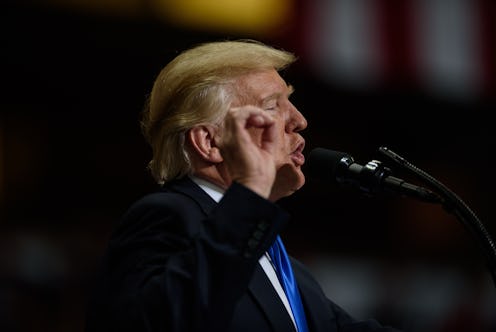News
Here’s How The Visa Lottery That Trump Hates So Much Actually Works

During a speech to police officers on Friday, President Trump set aside a few moments to condemn the U.S.'s visa lottery and, with equal force, the immigrants who apply for it. But his description of the program was loaded with inaccuracies, and if his comments do genuinely reflect his understanding of the visa lottery, it's clear that Trump doesn't know how the visa lottery works.
"They have a lottery," Trump said on Friday. "You pick people. You think the country's giving us their best people? No. What kind of a system is that? They come in by a lottery. They give us their worst people, they put them in a bin. But in his hand, when he's picking them, is the — really, the worst of the worst. 'Congratulations, you're going to the United States.' Okay. What a system. Lottery system."
The visa lottery — officially called the Diversity Visa Immigrant Program — is a U.S. program that allows citizens of other countries to apply for permanent residence in the U.S.. It's rather straightforward: Applicants submit their application through the U.S. State Department's website, and through random selection, 50,000 of those applicants are selected for vetting. Those who pass the vetting process are then given visas.
The lottery was created in 1990 in an attempt to diversify America's legal immigrant population (hence the word "diversity" in the official name). That's why it's only available to people from countries with relatively low rates of immigration to the U.S.; citizens of Mexico, Canada, Colombia, India and a handful of other countries are not eligible to apply for it.
It's all rather simple. Trump's characterization of the program, however, is factually inaccurate in several ways that are worth examining.
First of all, countries do not "give us their worst people." Or their best people, for that matter. Foreign governments don't "give" the U.S. anybody, because the decision to apply for the visa lottery lies solely with foreign citizens themselves. It's not as if the Hungarian government is hand-picking people and forcing them to apply for the visa lottery, so to say that any country "gives us their worst people" is flatly incorrect.
Trump is similarly wrong when he asserts that there is a person — presumably a U.S. official — who actively chooses the winners of the lottery. Again, the winners are selected by a random computer draw; that's what makes it a lottery. Trump's claim that "in his hand, when he's picking them, is the — really, the worst of the worst" both misrepresents how the program works and implies that some anonymous American official is, for no particular reason, intentionally admitting the "worst" immigrants into the country.
Lastly, there is absolutely no evidence that immigrants who come to America through the visa lottery are more likely to commit crimes than anyone else, or that they're "the worst of the worst" in any measurable way. The Government Accountability Office conducted in a study in 2007 to answer this precise question, and concluded that there was "no documented evidence of DV [Diversity Visa] immigrants from state sponsors of terrorism committing any terrorist acts" in the U.S..
As some have noted, Trump didn't merely misrepresent how the visa lottery works. He also, with the phrase "worst of the worst," insulted not only thousands of immigrants who've come to the U.S. legally, but also all of the Americans who gained citizenship by first coming to the U.S. through the visa lottery.
All of that being said, Trump's comments Friday were not a huge surprise. He's said before that he wants to eliminate the visa lottery altogether, and his false claim that countries "give us their worst people" mirrors his campaign launch speech, in which he claimed that "when Mexico sends it's people, they're not sending their best." That characterization of how immigration works was incorrect in 2015, and it's still incorrect now.